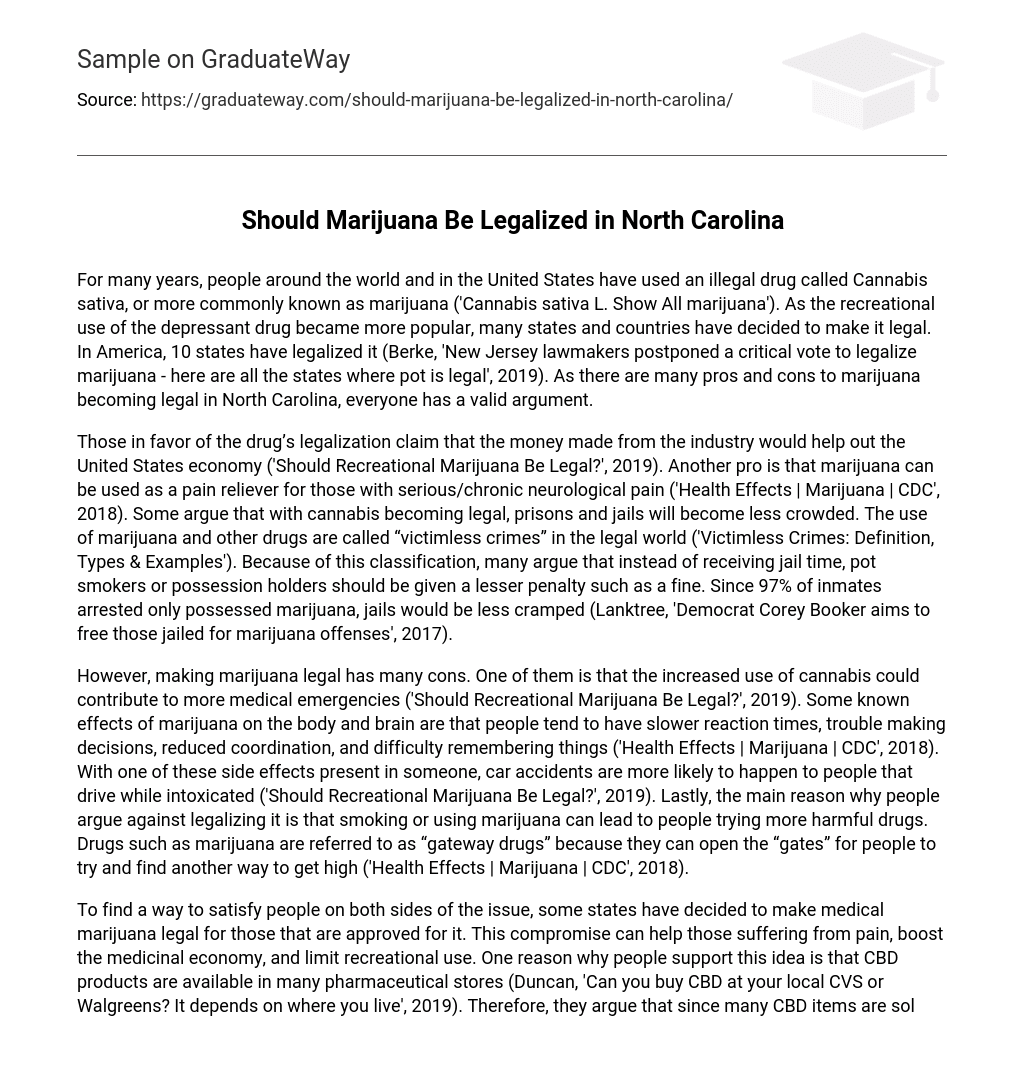For many years, people around the world and in the United States have used an illegal drug called Cannabis sativa, or more commonly known as marijuana (‘Cannabis sativa L. Show All marijuana’). As the recreational use of the depressant drug became more popular, many states and countries have decided to make it legal. In America, 10 states have legalized it (Berke, ‘New Jersey lawmakers postponed a critical vote to legalize marijuana – here are all the states where pot is legal’, 2019). As there are many pros and cons to marijuana becoming legal in North Carolina, everyone has a valid argument.
Those in favor of the drug’s legalization claim that the money made from the industry would help out the United States economy (‘Should Recreational Marijuana Be Legal?’, 2019). Another pro is that marijuana can be used as a pain reliever for those with serious/chronic neurological pain (‘Health Effects | Marijuana | CDC’, 2018). Some argue that with cannabis becoming legal, prisons and jails will become less crowded. The use of marijuana and other drugs are called “victimless crimes” in the legal world (‘Victimless Crimes: Definition, Types & Examples’). Because of this classification, many argue that instead of receiving jail time, pot smokers or possession holders should be given a lesser penalty such as a fine. Since 97% of inmates arrested only possessed marijuana, jails would be less cramped (Lanktree, ‘Democrat Corey Booker aims to free those jailed for marijuana offenses’, 2017).
However, making marijuana legal has many cons. One of them is that the increased use of cannabis could contribute to more medical emergencies (‘Should Recreational Marijuana Be Legal?’, 2019). Some known effects of marijuana on the body and brain are that people tend to have slower reaction times, trouble making decisions, reduced coordination, and difficulty remembering things (‘Health Effects | Marijuana | CDC’, 2018). With one of these side effects present in someone, car accidents are more likely to happen to people that drive while intoxicated (‘Should Recreational Marijuana Be Legal?’, 2019). Lastly, the main reason why people argue against legalizing it is that smoking or using marijuana can lead to people trying more harmful drugs. Drugs such as marijuana are referred to as “gateway drugs” because they can open the “gates” for people to try and find another way to get high (‘Health Effects | Marijuana | CDC’, 2018).
To find a way to satisfy people on both sides of the issue, some states have decided to make medical marijuana legal for those that are approved for it. This compromise can help those suffering from pain, boost the medicinal economy, and limit recreational use. One reason why people support this idea is that CBD products are available in many pharmaceutical stores (Duncan, ‘Can you buy CBD at your local CVS or Walgreens? It depends on where you live’, 2019). Therefore, they argue that since many CBD items are sold, why shouldn’t the actual thing be too?
In conclusion, I believe that marijuana should be legal for medicinal purposes, and be decriminalized. This is different than being fully legal, as decriminalization would just give a weaker punishment to those caught with cannabis. Prisons in North Carolina and around the U.S. are full of people who just made one bad decision; they shouldn’t have to serve time behind bars for that. If medical marijuana becomes completely legal and decriminalized, people can finally find relief in the pain that makes their lives hard each day, and spend less time in jail.





